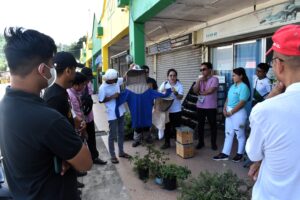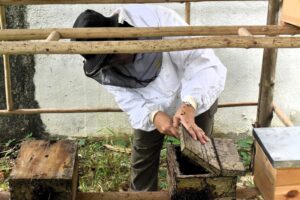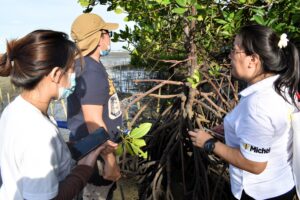On July 17 and 18, IIRR-Philippines held a BEEyond the Hive: Introduction to Beekeeping event in Barangay Calimpak, Guinayangan, Quezon. Participants from the Organic Market Association (OMA), Zoological Society of London (ZSL), Cavite State University (Cavsu), and local fisherfolk attended the activity.
 The primary objectives of the event were to enhance participants’ understanding of the importance of bees and biodiversity conservation, introduce participants to the fundamental concepts of beekeeping, and encourage them to engage in responsible beekeeping practices.
The primary objectives of the event were to enhance participants’ understanding of the importance of bees and biodiversity conservation, introduce participants to the fundamental concepts of beekeeping, and encourage them to engage in responsible beekeeping practices.
The event featured presentations and discussions by the Director of Cavite State University’s Bee Research Innovation, Trade and Extension (BRITE) Center, Michele T. Bono, and the Head of the Training and Extension Unit, Dickson N. Dimero. Topics covered included Bee Program Bee Biology, Issues and Concerns in Beekeeping, and Stingless Beekeeping. The presenters also conducted a hands-on demonstration of splitting colonies and harvesting honey.
During the event, two colonies of bees were distributed to each participating household.
 Beekeeping has proven crucial in mangrove areas due to its many benefits for the ecosystem and local communities. The practice also aligns with the goals of IIRR’s Improving Coastal Resilience and Ecosystem Services through Biodiversity Restoration (ICORE) project, which promotes conservation efforts in coastal resource management and agrobiodiversity. Beekeeping offers numerous ecological advantages, including pollination, habitat enhancement, biodiversity conservation, environmental education, and climate change resilience. Beekeeping also provides health benefits through the production of nutritional honey and alternative livelihood opportunities through the marketing of honey and its by-products, most notably beeswax.
Beekeeping has proven crucial in mangrove areas due to its many benefits for the ecosystem and local communities. The practice also aligns with the goals of IIRR’s Improving Coastal Resilience and Ecosystem Services through Biodiversity Restoration (ICORE) project, which promotes conservation efforts in coastal resource management and agrobiodiversity. Beekeeping offers numerous ecological advantages, including pollination, habitat enhancement, biodiversity conservation, environmental education, and climate change resilience. Beekeeping also provides health benefits through the production of nutritional honey and alternative livelihood opportunities through the marketing of honey and its by-products, most notably beeswax.
This event was made possible through a partnership with Cavite State University’s BRITE Center, which aims to introduce beekeeping as part of agriculture to help in pollination and provide products that could serve as additional sources of income for the community. The long-term goal of this partnership is to create a network of responsible beekeepers in the Philippines. As part of their support, IIRR assisted in the site assessments to establish meliponary (bee nurseries) and will contribute to monitoring efforts for Stingless Bee populations.



